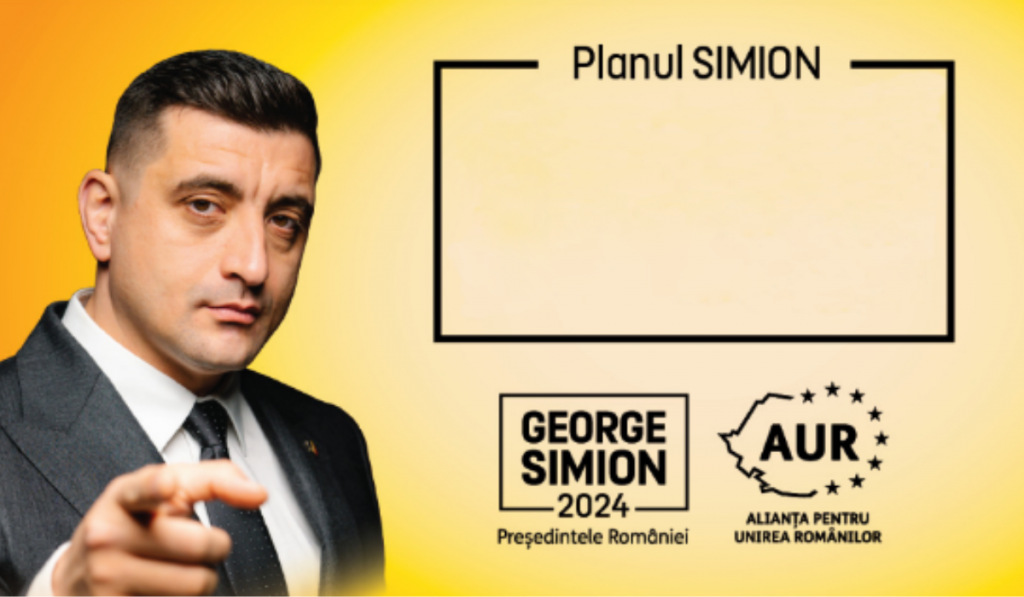Far-right Romanian presidential candidate George Simion is not just running a campaign, he’s waging a meme war. In today’s digital age, argues Mimi Mihăilescu, the way politicians communicate with the public has fundamentally shifted – and internet memes are emerging as powerful weapons for shaping public perception and discourse
We are entering an era where individual personalities often eclipse party ideologies – and even parties themselves. The recent campaign of far-right Romanian presidential candidate George Simion is a perfect case study of how political actors use memes to craft and amplify a candidate’s image.
Memes have evolved into something far more powerful than mere internet jokes. Bypassing traditional media, they have become potent tools for shaping public perception and discourse. In political campaigning, memes are especially useful to populist and far-right candidates who thrive on anti-establishment sentiment.
Simion has embraced memes not just as part of his communication strategy, but as a central pillar of his campaign. He has engaged his supporters on a deeply personal level, turning himself into a political celebrity in the process.
The striking aspect of Simion’s meme strategy is his use of a specific meme template. Making direct eye contact with the viewer and with a 'finger gun' inspired by the early 20th-century recruitment posters featuring Lord Kitchener and Uncle Sam, Simion's template has been modified countless times – by both supporters and opponents – a blank canvas for internet users to either praise or mock him:

Simion's supporters have shared his original Alliance for the Union of Romanians (AUR) campaign picture (bottom left corner) or amended the template, superimposing positive messages. Slogans like 'The man Romania needs' or 'A true patriot' reinforce Simion's image as a champion of the people.
His critics, meanwhile, have added sarcastic, mocking captions such as 'Abolish the law of gravity, and all Romanians will be able to fly' (top quote, bottom right), 'Kürtőskalács just 5 RON for ethnic Hungarians who vote AUR' (top right corner). (Kürtőskalács is a traditional dessert for Hungarians from Transylvania, and ethnic Hungarians in Romania usually vote for the Democratic Union of Hungarians from Romania.)
Both serve to amplify Simion's presence, ensuring that his image – and his name – remain in the public consciousness.

By flooding social media with his own content, Simion not only controls the narrative, he also ensures that his messages reach voters unfiltered.
This is a significant departure from the times when candidates relied heavily on traditional media to convey campaign messages. Today, candidates like Simion can reach millions of potential voters directly through social media, with memes as their main vehicle.
Such direct engagement is particularly appealing to younger voters, who are more likely to consume political content online than through traditional media. Simion’s campaign thus circumvents the gatekeeping role of journalists, allowing him to shape his image and message without external interference.
Using memes as a political vehicle allows candidates to circumvent the gatekeeping role of journalists, and to shape their image and message without external interference
This tactic is not just about reach; it’s about resonance. Memes, with their viral potential, can amplify a message far beyond the capabilities of traditional political advertising. These images, coupled with snappy, relatable captions, reinforce the idea that Simion is one of 'us' rather than one of 'them'. It is particularly effective in a country where distrust of politicians runs high amid a growing appetite for anti-establishment rhetoric.
Being the subject of conversation – positive or negative – is often more valuable than the content of the conversation itself. The constant adaptation of Simion’s meme template has made him a central figure in Romania’s online political discourse, blurring the lines between endorsement and critique.
Memes do more than just reflect a candidate’s personality – they also serve as powerful amplifiers of ideology. Simion’s memes often carry subtle (and sometimes not-so-subtle) nationalist and populist messages.
Embedding these ideas in humorous or provocative content, Simion can communicate his ideology to a broad audience without overt messaging that might alienate some voters. A meme that jokingly mocks EU bureaucracy, for example, can simultaneously reinforce nationalist sentiments among voters who feel alienated by Romania’s relationship with the EU.
By embedding campaign messages in humorous or provocative content, political candidates can communicate their ideology to a broad audience without overt messaging that might alienate some voters
Humorous elements can also appeal to voters who might not otherwise engage with traditional political discourse. In an age where voters often feel disconnected from mainstream politicians, Simion’s memes present him as a figure who is not only in touch with topical issues, but also speaks the language of the people.
Memes' viral nature means that these messages can spread rapidly across social networks, reaching far beyond Simion’s immediate supporters. As memes are shared, liked, and commented upon, they take on a life of their own, becoming part of the broader political discourse. This amplifies Simion’s message, and helps normalise and legitimise his political platform within the mainstream.
Simion’s presidential campaign is testament to the power of memes in modern-day politics. By harnessing the viral potential of internet culture, Simion has managed to craft a compelling, relatable image that resonates with a wide audience.
His memes also offer a glimpse into the future of political communication. The influence of traditional media continues to dwindle, as social media becomes increasingly central to our lives. Memes, therefore, are likely to play an increasingly significant role in shaping political narratives.
Social media memes are reshaping the political landscape in ways we are only just beginning to understand
For candidates like Simion, memes are not just tools – they are weapons in the battle for public opinion. The widespread adaptation of his campaign meme template, whether in support or mockery, supports the idea that in the digital age, visibility is king. It’s clear that memes are not just a passing trend; they are here to stay – and they are reshaping the political landscape in ways we are only just beginning to understand.
The rise of meme politics also raises important questions about the future of democratic discourse. While memes can make politics more accessible, they can also oversimplify complex issues and contribute to the polarisation of public opinion.
As memes continue to blur the line between entertainment and politics, voters will need to become more critical of the content they consume. Voters will also need to be more aware of how these seemingly innocuous images shape their perception. For better or worse, the future of political campaigns may very well be determined by who can create the most shareable meme.